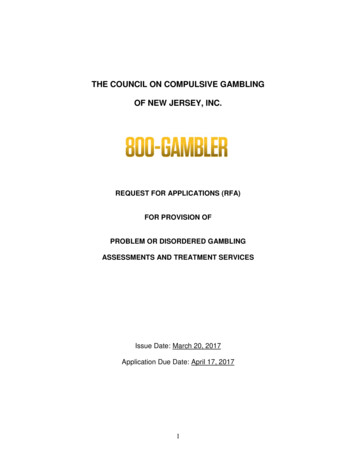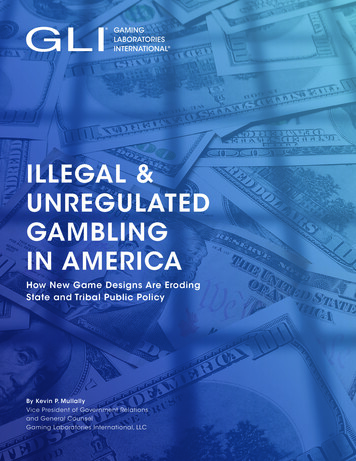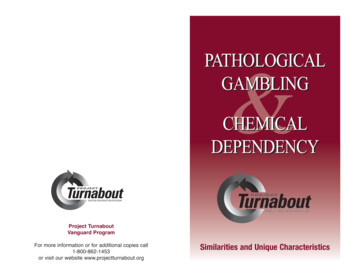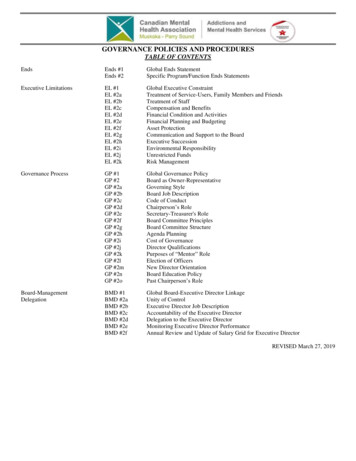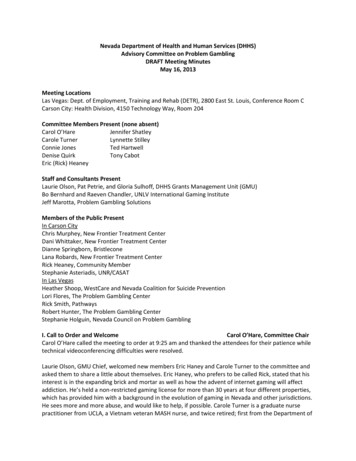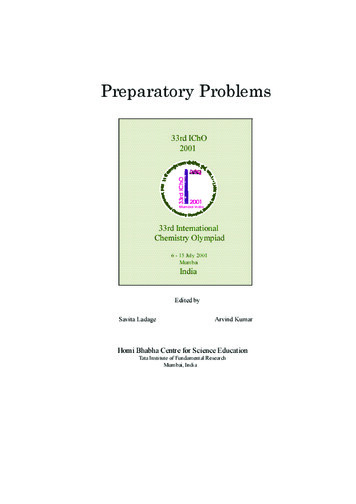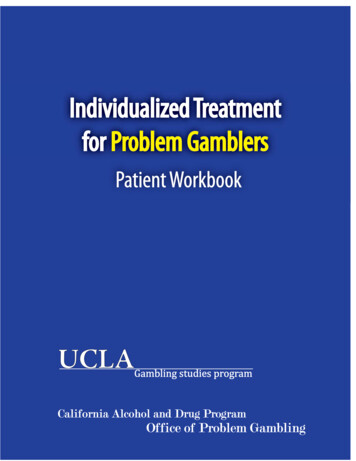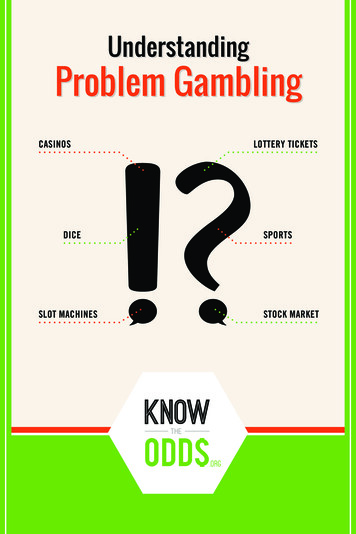
Transcription
UnderstandingProblem GamblingCASINOSDICESLOT MACHINESLOTTERY TICKETSSPORTSSTOCK MARKET
TABLESECTION 01SECTION 02SECTION 03OFCONTENTSDefining Gambling2The Demographics & Risk Factors ofProblem Gambling8Not Just a Financial Issue:The Consequences of Problem Gambling10SECTION 04Warning Signs: Identifying a Problem?14SECTION 05Getting Help18SECTION 06Resources211
Section 01: Defining GamblingFor most people, gambling is a recreational activity. It’s a social experience,a form of entertainment, and a chance to bond with friends around commoninterests like sporting events or a weekend game of cards. The majorityof people will gamble without ever suffering any negative effects from it.But then there are the others.For some, gambling takes on a much more serious role in their life. It becomesa compulsion and an uncontrollable behavior. It becomes something theyhave to do to the detriment to other aspects of their life. Understanding thedifference between responsible gambling and problem gambling is critical inkeeping ourselves, our friends and our loved ones safe from gambling addiction.Gambling vs. Problem GamblingCommon Methods of Gambling Lottery Raffles/Pools Casinos Internet Card Games Sports Events Quick Draw Horse/Dog Racing Slot Machines Games of Skill Bingo Pulltabs Numbers Stock Market DiceGambling is the act of wageringsomething in the face of an uncertainoutcome. When we gamble, we’replacing an item of value at risk in anattempt to gain something of evengreater value. The act of gaining thatgreater value, whether it is a money,object or service, can be the result ofeither skill of the gambler or blind luck.Most will gamble in moderation or inconjunction with specific events likethe Super Bowl. It’s a means of entertainment and socializing. No differentthan going to the movie theater orexerting energy through physicalhobbies, people enjoy the excitementof spending a poker night with friends,making it “to the end” and fightingelimination from the tournament.2
Of all adults over the age of 18.SOURCE: NATIONAL COUNCIL ON PROBLEM GAMBLING85%Have gambled at least once in their livesHave gambled in the past year60%It’s the excitement associated with gambling that keeps responsible gamblerscoming back and has established gambling as an enjoyable activity for mostadults. Today, it’s easy to find opportunities for gambling at locations ascommon as your home, office and grocery store, as well as local casinos andsports facilities.THE TYPE OF SOCIAL GAMBLING DESCRIBED ABOVE IS NOT WHAT WE’REREFERRING TO WHEN WE TALK ABOUT PROBLEM GAMBLING.3
A Problem Gambler.DEDICATESMORE TIME,DEDICATESMORE THOUGHT,& DEDICATESMORE MONEY.toward gambling thana social gamblerProblem gambling is defined a varietyof ways by the research community,from people who fall just short of thecriteria for pathological gamblingto persons whose gambling behaviorcompromises, disrupts or damagespersonal, familial or professionalpursuits. According to National Councilon Problem Gambling, the term“problem gambling” is used as a moreinclusive category to encompass acontinuum of gambling difficulties,with pathological gambling residingat one end of the problemgambling spectrum.Pathological gambling is a progressivedisorder in which an individual hasa psychologically uncontrollablepreoccupation with an urge to gamble,resulting in damage to professional,familial and social interests.First diagnosed and recognized bythe American Psychiatric Associationin 1980, pathological gambling ischaracterized by a chronic andprogressive inability to resist theimpulse to gamble.2%-3% (4M-6M) of adults in the U.S. will have a gamblingproblem in any given year. Another 1% (2M) of adults willmeet the criteria for pathological gambling.SOURCE: NATIONAL COUNCIL ON PROBLEM GAMBLING4
According to the NationalEpidemiologic Survey onAlcohol and RelatedConditions, of pathologicalgamblers surveyed.To be diagnosed asa pathological gambler,an individual must meet fiveof the ten diagnostic criteriaestablished by the AmericanSOURCE: PETRY, NM, ET AL, 2005Psychiatric Association: The individual thinksconstantly about gambling 73%Had an alcoholuse disorder38%Had a drug usedisorder60%Had nicotinedependence.2The individual increases betsto sustain gambling thrill The individual exhibitsagitation when cutting back The individual gambles.1as an escape The individual chases losses The individual liesto conceal The individual jeopardizes.4significant relationships The individual relies onfinancial bailout The individual fails in15-20%in effort(s) to controlor stop gambling5Attempt suicide
Every year, more than four million United States adultsexperience an increased drive to gamble, which results in greatpersonal and financial loss. This is problem gambling. It isthese behaviors we look to address to prevent victims ofgambling addictions from suffering emotional, physical andfinancial losses.SOURCE: NATIONAL COUNCIL ON PROBLEM GAMBLINGChance, Skill and Perceived SkillThe danger of problem gambling is intensified by both the skill and the lackof skill required to play. While many card games require skill and strategyto increase the odds of success, other opportunities, such as lottery ticketsand electronic gaming machines require no skill, as all outcomes arepredetermined regardless of the player’s actions, with the odds of winningup to chance, even when the player has the illusion their timing, wagermaking or button pressing could alter the outcome.Problem gamblers who considered themselves skilled keep playing thinkingthey’ll eventually outsmart the game.They also believe in the idea of chance and keep playing until their“luck changes”, falling deeper into debt.6
What is Gamblers Fallacy?Over the past century, thousands of people have fallen victim togambler’s fallacy, the notion people mistakenly come to have thatmakes them believe the chance of a random occurrence with a fixedprobability will increase or decrease due to recent occurrences.At the Monte Carlo Casino in 1913, a roulette streak occurred inwhich the ball landed on black 26 consecutive turns, causing anincredible amount of attention at the casino. As the streak continued,bettors made increasingly high wagers on red, thinking the streakcould not continue and the ball was “due” to land on red. “It justhas to be red next!”What these bettors failed to realize was that, although the streakseemed unbelievable, each turn was an independent event. Thus,whether the streak of landing on black had reached 3 turns or 30turns, the odds the next turn remained evenly split betweenred (47.37%) and black (47.37%).Consider another example. When flipping a coin, the probability oflanding on heads is equal to the probability of landing on tails.Whether previous turns have resulted in a mix of heads and tails orresulted in a streak of landing solely on heads, the probability of theoutcome for the next turn will never change. It will always be ½heads, ½ tails.Gambler’s fallacy causes people to continue their gambling beyonda healthy or manageable end-point. Whether it’s a daily lotteryticket buyer who is “due” for a win or a slots player certain the nextquarter must be a winner after so many losses, gambler’s fallacy canseverely encourage problem gambling.7
Section 02: The Demographics & Risk Factorsof Problem GamblingProblem gambling doesn’t discriminate. It affects men, women and adolescentsof all ages. While gambling is illegal for individuals under the age of 18, therisk of developing problem gambling begins in early youth and can develop atany point in one’s life, especially after times of significant lifestyle changesor dramatic life events.Though you may not have realized problem gambling can affect people withinyour community, this addiction touches of all ages, ethnicities, backgroundsand other demographic categories.AgeProblem gambling affects people of all ages, from high schools to seniorcitizens, and the problem can begin at any age. It is widely known thatproblem gamblers are more likely to have been introduced to gamblingat a younger age than most people.GenderThough years of studies suggested that men made up a 2/3 majorityof all problem gamblers, that gap is closing quickly in recent years. Morewomen every year are turning to forms of gambling such as Internet Pokerand slot machines as methods of escaping emotional problems andtroubling circumstances at home.8
EthnicityWhites, Blacks and Hispanics are all equally likely to gamble on a weeklybasis, though Whites are less likely to experience problem gambling. Noethnicity is untouched from the consequences of problem gambling.BackgroundThough never-married people are more likely to experience problemgambling, this addiction touches married, divorced and widowed people aswell. Problem gambling affects people regardless of their employment andeducation, and it affects people with and without co-occurring addictions.Risk FactorsWhile most people gamble occasionally in social settings, such as ata casino, placing a bet at a sporting event or buying a lottery ticket at thegrocery store, some are at a greater risk of developing problem gambling.Some of these common risk factors include: Easy access or close proximity to gambling opportunities Early success (“Beginner’s luck”) that distortsan individuals understanding of the extremely low oddsof winning Boredom or loneliness Pre-existing mental health problems, such as ObsessiveCompulsive Disorder, Schizophrenia, depression and anxiety Desperate financial issues a “big win” would solve Traumatic experiences or abusive upbringings of whichthe distraction of gambling would provide an escape Coexisting addictive behaviors, such as drug or alcohol abuse9
Section 03: Not Just A Financial Issue: The Consequencesof Problem GamblingThe consequences associated with problem gambling extend far beyond theimpacts to savings or troubles paying the bills, affecting a person’s emotionaland overall wellbeing. As the length and severity of a person’s problemgambling increases, so do the consequences they face, including damageto personal relationships at home, their professional reputations and theirmental and physical health.Below are a few of the most common consequences of problem gambling:Career and ReputationProblem gambling can have severe consequences on an individual’sjob and his or her relationship with coworkers. Severe gamblingproblems can lead individuals to begin missing workdays or employeefunctions without giving any notice. Signs of financial stresses maybegin to show at work when the employee needs money both topay off debts and to continue gambling, and may lead individualsto request to borrow money from coworkers or as advances fromemployers. The most severe cases of problem gambling may leadindividuals to theft and other illegal actions in order to obtainmoney or objects of value.Problem gamblers can become withdrawn from management andcolleagues, and the distraction of gambling will negatively affect theproductivity and quality of the individual’s work. This is most oftenseen when the individual is active in online gambling or uses timeat work to check score sheets, follow the stock market and placebets over the phone.10
Possessions and PropertyAt the root of many gambling problems is the compulsion to win –win more money, possessions or other items of value. Unfortunately,these are the same things lost at the hand of compulsive gambling.The sudden flaunting of new items and possessions is a commonsign of someone with problem gambling. This developing focus onthe monetary value or rareness of an item is not only a sign of agambling addiction, but a sign debts may be accruing as these itemsof value are sought. The accumulation of debt by gambling can rackup hundreds of thousands of dollars of credit card charges and causethose affected to lose their homes, cars and other possessions andnecessities. The loss of these will affect both the gambler and theother individuals in his or her household and extended personal life.Family and FriendsUnless help is sought, the impacts of problem gambling on familiesare often devastating and irreversible. From relationships with parents,spouses and friends to the safety and happiness of young children,problem gambling affects the complete dynamic of a gambler’s life andsocial circle, even threatening to destroy it. The losses faced include:Loss of trust: The problem gambler is driven to the activity bycompulsion, causing him or her to sacrifice other commitments andresponsibilities to gamble. Over time problem gambling may havethe individual removed from having certain responsibilities, such aspaying the bills or doing the weekly grocery shopping. Becomingrestricted from access to family funds and property is common amongindividuals who are struggling with problem gambling. Beyondfinancial trust, family and friends may become weary of trusting anindividual seen as deceptive and without everyone in the relationship’sbest interest in mind.(CONTINUED ON NEXT PAGE)11
Family and Friends (CONTINUED)Loss of respect: Problem gambling causes issues not only for theindividual but for all with close relationships to the individual.The added stress, frustration and mounting losses of these individualswill cause resentment and a loss of respect that can takeyears to repair.Crumbled relationships: People close to the individual may find it oftheir own benefit to minimize or cease interaction with the gamblingindividual. These relationships can be broken for months, years orpermanently if the gambler doesn’t seek help for his or her compulsion.Changing family dynamics: The recognition of a problem gamblingwill affect members of the family in a variety of ways. From spousesor adult siblings taking on greater responsibilities to young childrenworried and trying to understand, the entire family unit suffers as anoutcome of problem gambling activity. Divorce is not uncommon forfamilies struggling with problem gambling.Financial problems affecting the family: Whether it is the mortgagepayment, the cable bill or college tuition savings lost in a series ofgambles, a number of financial problems can affect the entire family’sfinancial wellbeing.Reputation among family and friends: Restoring an individual’sreputation after losses of trust and respect takes time and atremendous amount of effort. Reputation lost while a problem gambleris something to be regained only if both parties are open to it in therecovery process.12
HealthProblem gamblers are more likely than non-gamblers to have a numberof health issues, exacerbating personal relationships and productivityat work as sick time becomes necessary. Common ailments amongproblem gamblers include but are not limited to*: Dental or oral problems Migraines Chronic tirednessRespiratory problemsObesitySleep disturbancesMuscle and pain issues*ACCORDING TO GAMBLING IN CONNECTICUT: ANALYZING THE ECONOMIC AND SOCIAL IMPACTS, 2009.Elevated Emotional Distress & Suicide RatesPeople struggling with problem gambling are prone to higher rates ofdepression and thoughts of suicide due to medical, financial andpsychological reasons.Becoming preoccupied with gambling, compulsive gamblers may havehigh blood pressure, trouble sleeping, headaches and other medicalissues triggered by gambling-induced stress. Individuals struggling withgambling addictions are more likely to be simultaneously strugglingwith other addictions, such as drugs and alcohol, and may also sufferfrom panic and anxiety disorders.As problem gamblers accumulate debts and losses through meanssuch as credit cards, personal loans or through selling possessions,the stress and anger of both the individual and family and friendsalso suffering commonly causes a great deal of despair that problemgamblers feel they may be unable to escape.According to a fact sheet released by Oregon Health Authority in 2012,4.8% of gamblers who had sought treatment had attempted suicide,while 27.4% reported having suicidal thoughts.13
Section 04: Warning Signs: Identifying a Problem?Problem gambling has many warning signs. By answering a few questions,you can begin to identify if you, an adult loved one, a child or a coworker areshowing signs of having a gambling problem.Questions to Ask about Yourself1.Are you haunted by debt collectors?2.Do you gamble to escape worry, boredom or trouble?3.Do thoughts of gambling disrupt your sleep?4.Do you ever gamble longer than originally planned?5.Do arguments, disappointments or frustrations cause you to gamble?6.Do you celebrate good times with gambling?7.Have you ever had self-destructive thoughts because of problemsresulting from gambling?8.Have you lost time from work or school due to gambling?9.Do you use the rent/mortgage or food money for gambling?10. Do you borrow money to finance gambling or pay back gambling debts?11. Do you promise your spouse, partner or other loved one you willstop gambling, yet continue to gamble?12. Have you noticed a personality change since you began gambling?13. Are you away from home or unavailable to family or friendsfor long periods of time due to gambling?14
Questions to Ask about an Adult Loved One1.Is a loved one haunted by debt collectors?2.Does your loved one gamble to escape worry, boredom or trouble?3.Do thoughts of gambling disrupt his or her sleep?4.Does your loved one ever gamble longer than originally planned?5.Do arguments, disappointments or frustrations cause yourloved one to gamble?6.Does your loved one celebrate good times with gambling?7.Has your loved one had self-destructive thoughts because of problemsresulting from gambling?8.Has your loved one lost time from work or school due to gambling?9.Do you hide the rent/mortgage or food money because your lovedone gambles it away?10. Does your loved one borrow money to finance gambling or to payback gambling debts?11. Does your loved one promise faithfully that she or he will stopgambling, yet continues to gamble?12. Have you noticed a personality change in a loved one as hisor her gambling has progressed?13. Is your loved one away from home or unavailable to family and friendsfor long periods of time due to gambling?15
Questions to Ask About an Adolescent1.Does the adolescent have unexplained absences from school or classes?2.Did the adolescent have a sudden drop in grades or fail to completeassignments on time?3.Has there been a change in the adolescent’s personality or behavior?4.s the adolescent making exaggerated displays of money or othermaterial possessions?5.Is the adolescent partaking in daily or weekly card games?6.Does the adolescent brag about winning at gambling?7.Does the adolescent show an intense interest in gambling conversations?8.Does the adolescent have an unusual interest in newspapers,magazines, periodicals and other outlets containing odds and scores?9.Is the adolescent unable to explain the origin of new itemsof value in possession?10. Is the adolescent borrowing or stealing money?11. Does the adolescent uncharacteristically forget appointments or dates?12. Is the adolescent exaggerate the use of the word “bet” in his or hervocabulary and/or use other gambling language (such as bookie,point spread, underdog, favorite) in conversations?16
Questions to Ask about an Employee or Coworker1. Does the employee spend excessive time away from his or her job?This excessive time may include: Extended use of the telephone to place bets or check results Time spent reviewing form sheets, racing, sports or the stockpages in the newspaper rather than working Participating in cards, lottery and/or office pools often2. Does the employee take unusual amounts of sick time, especiallyhalf days? The compulsive gambler frequently takes excessive time.While using sick time to gamble, s/he also often suffers from: DepressionHypertensionUlcers3. Does the employee routinely arrive late, leave early, take long lunchbreaks or experience difficulties reporting and/or remaining inscheduled work location(s)?4. Does the employee talk or worry about money problems or experiencemoney difficulties, resulting in requests for cash advances or loansfrom fellow employees and/or the employer?5. Does the employee always seem to be the person who starts and/orruns the office pools (such as during sporting events, lotterytickets, bets involving births)6. Does the employee encourage co-workers to bet in office poolsand/or bet more money?7. Does the employee try to organize an office excursion to a casinoor racetrack?8. Does the employee have a history of writing bad checks?9. Does the employee have more than one mailing address?10. Does the employee’s use of company money seem suspiciousor inappropriate?17
Section 05: Getting HelpOvercoming a gambling addiction isn’t easy, but there are programs availableto help. Problem gambling issues are faced by hundreds of thousands ofNew York State residents every year. We encourage you to take advantage ofthe many resources dedicated to aiding both gamblers and their family andfriends through steps in recovery.Below are some of the most common types of resources available.Self HelpSelf help programs allow problem gamblers to identify the severity of theirgambling problem, the consequences, the goals and the process throughwhich problem gamblers can regain control of their financial stability,their personal relationships and their futures. They may involve step-basedprograms, counseling, peer support or independent efforts utilizingworkbooks and online resources.Step-Based ProgramsStep-based programs help coach problem gamblers through their recoveryby helping them identify the different phases of recovery and partake indiscussions with other gamblers and with counselors in order to successfullystop their gambling activity.Motivational InterviewingOvercoming addictive behaviors requires time, energy and motivation. Often,the best outcomes require guidance, emotional support and a tremendousamount of self-reflection.Over the last few decades, the use of motivational interviewing techniqueshas spread across programs seeking changes in behavior, from alcohol anddrug abuse programs to nutrition and exercise programs.Based on empathetic rather than confrontational approaches to conversationsabout problem gambling, motivational interviewing has successfully allowedindividuals facing health, financial and emotional crises reach positive behavioralchanges and outcomes due to counseling by specially trained therapists.18
Through conversation with therapists who provide an empathetic and openspace to speak, the problem gambler’s perception of his or her situation canbe defined, engaging conversation can determine the roots of these gamblingproblems or other co-occurring disorders and personal goals can be made,monitored and refined throughout the relationship.Gambler’s Anonymous 12-Step Program1.We admitted we were powerless over gambling - that our liveshad become unmanageable.2.Came to believe that a Power greater than ourselves could restoreus to a normal way of thinking and living.3.Made a decision to turn our will and our lives over to the careof this Power of our own understanding.4.Made a searching and fearless moral and financial inventoryof ourselves.5.Admitted to ourselves and to another human being theexact nature of our wrongs.6.Were entirely ready to have these defects of character removed.7.Humbly asked God (of our understanding) to removeour shortcomings.8.Made a list of all persons we had harmed and became willingto make amends to them all.9.Make direct amends to such people wherever possible,except when to do so would injure them or others.10. Continued to take personal inventory and when we were wrong,promptly admitted it.11. Sought through prayer and meditation to improve our consciouscontact with God as we understood Him, praying only forknowledge of His will for us and the power to carry that out.12. Having made an effort to practice these principles in all our affairs,we tried to carry this message to other compulsive gamblers.19
Peer SupportWhen faced with the need to end a problem gambling issue, it is importantfor family and friends to provide emotional and motivational support.Whether it’s a ride to a counseling session or an ear on the phone, a noteof encouragement or a celebration of milestones achieved, acts of supportsmall and large go far in increasing the ability of an individual to overcomeproblem gambling issues.While the support of family and friends is critically important, peer supportprovides individuals with a community of people who have faced or arecurrently facing the same problems and goals. Family and friends may beable to voice words of encouragement, but they are not always able tounderstand some of the key issues faced, such as: How did my problem gambling begin? When did I lose control of my gambling? How did I allow it to continue when facing losses of money,property and relationships? Why is quitting my gambling difficult?Peer support provides a community of people who are struggling with thesame issues. At various stages of recovery, the individuals of peer supportcommunities can speak about their own experiences, their goals, hurdlesand solutions. Conversations with people who know exactly what you or theproblem gambler you know are going through will be more open and honest,freed of the fears of judgment problem gamblers face when speaking abouttheir problem gambling with family and friends.20
Section 06: ResourcesIf you believe your gambling is harming you, or you know someone whois being negatively affected by gambling, there are many agenciesand organizations that can help.The New York Council on Problem Gamblingwww.nyproblemgambling.orgThe New York Council on Problem Gambling is a not-for-profitindependent corporation dedicated to increasing public awareness aboutproblem and compulsive gambling and advocating for support servicesand treatment for persons adversely affected by gambling.New York State Office of Alcoholism and Substance Abuse Serviceswww.oasas.ny.govThe mission of NYS OASAS is “to improve the lives of New Yorkers byleading a premier system of addiction services through prevention,treatment and recovery.” OASAS is responsible for planning, developingand regulating the state’s system of chemical dependence and gamblingtreatment agencies.National Council on Problem Gamblingwww.ncpgambling.orgThe mission of NCPG is “to increase public awareness of pathologicalgambling, ensure widespread availability of treatment for problemgamblers and their families, and to encourage research and programsfor prevention and education.”21
Gamblers Anonymous www.gamblersanonymous.org“Gamblers Anonymous is a fellowship of men and women who sharetheir experience, strength and hope with each other that they may solvetheir common problem and help others recover from a gambling problem.The only requirement for membership is a desire to stop gambling.”Supported by contributions, there are no dues or fees to be a memberof Gamblers Anonymous.Gam-Anon International Service Office, Inc.www.gam-anon.orgGam-Anon is a 12-step self-help fellowship of men and women who havebeen affected by the gambling of a loved one. The community providessupport whether loved ones cease gambling or continue to gamble.New York State Gaming Commissionwww.gaming.ny.govThe New York State Gaming Commission is dedicated to ResponsiblePlay and is involved in a variety of issues surrounding problem gambling,including ensuring that gaming venues comply with all rules andregulations and undertake proper outreach measures, and self-exclusionpolicies across the state.22
ReferencesFor more information with regard to the information presented above,visit the following resources.“FAQs – Problem Gamblers,” The National Council on Problem Gambling.“National Problem Gambling Awareness Week,” The National Councilon Problem Gambling.(2009) “GAMBLING IN CONNECTICUT: Analyzing the Economicand Social Impacts.” Spectrum Gaming Group.Croson, R. and Sundali, J. (2005) “The Gambler’s Fallacy and the Hot Hand:Empirical Data from Casinos.” The Journal of Risk and Uncertainty, 30:3;195-209. Springer Science Business Media, Inc.23
FIND HELP FOR GAMBLING PROBLEMS1-877-8-HOPENY1-877-846-736924
It affects men, women and adolescents of all ages. While gambling is illegal for individuals under the age of 18, the risk of developing problem gambling begins in early youth and can develop at any point in one's life, especially after times of significant lifestyle changes or dramatic life events.



